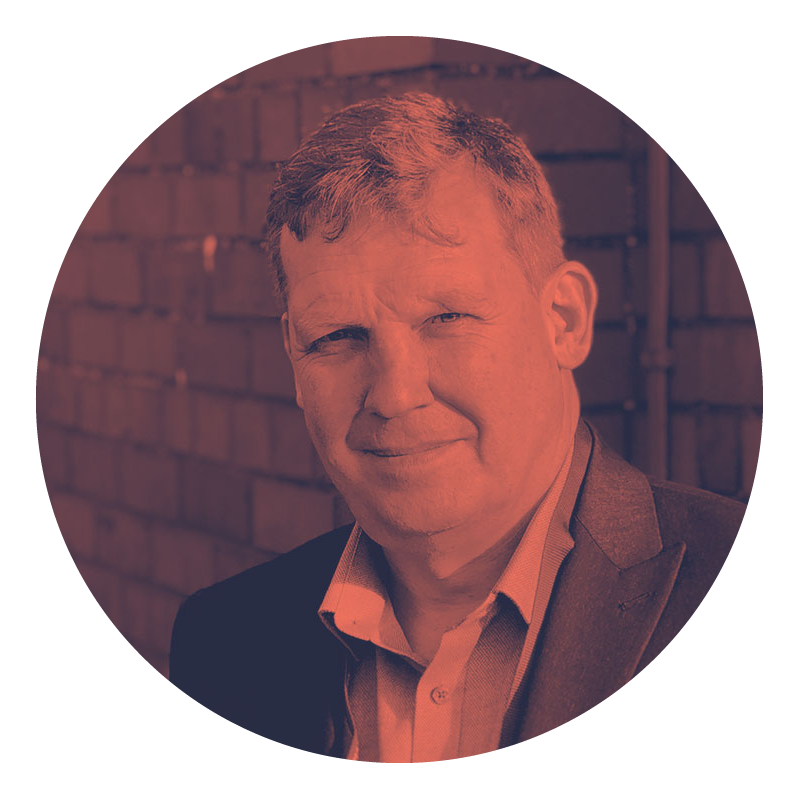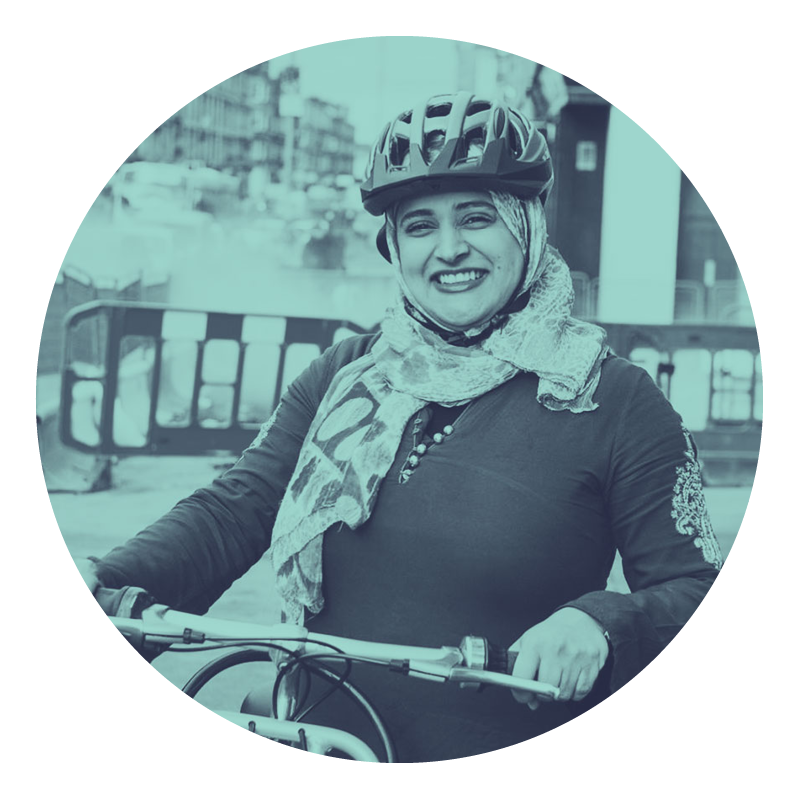Fairer Futures
We all use energy – from heating, cooking and lighting to transport, as well as creating products and gadgets. In less than 40 years our total energy consumption has doubled and with our population rising and modern living standards becoming more common, we are demanding more energy than ever before.
In the recent past, we have been heavily dependent on fossil fuels to fuel our lifestyles. However, releasing energy from fossil fuels involves burning them, which releases harmful gases called greenhouse gasses into our atmosphere, such as carbon dioxide. Global warming is the result, and it is having a devastating effect on our planet.
To stop our planet getting warmer we need to move to net-zero emissions, and we have an opportunity to do so in a way that everyone benefits. The many ‘just transitions’ that will need to happen will take place in all areas of our society. This can be achieved by ending our dependency on fossil fuels as an energy source and making do with the resources we have or adopting new technology and developing more planet-friendly infrastructures.
For example, the just transition to net zero emissions will particularly impact Scotland’s oil and gas industry. Oil and Gas UK have worked closely with the UK Government to set out the North Sea Transition Deal. Within this deal, the oil and gas sector and the UK Government have committed £14-16 billion to invest in new technologies and support the reskilling of workers by 2030. This deal also allows for the support and creation of approximately 40,000 direct and indirect supply chain jobs. This is just one example of an industry taking steps towards a more sustainable future.
As part of the Fairer Futures campaign, Glasgow Science Centre will be exploring the idea of a Just Transition by engaging with the perspectives from across Energy, Transport and Travel sectors in Scotland. We reached out to professionals in these sectors to hear their thoughts on how we can achieve this and stay on track for net-zero by 2045. We have also included additional resources from GSC to help you explore the technology, skills and opportunities required while achieving a just transition.
Please explore the interviews in full below.
What is Just Transition?
Just Transition is an action, or something that is described as being morally right or fair for everyone. In the context of climate change, and our transition to net zero, it means that everyone is able to benefit from the new system and no one is left behind.
The Scottish Government has committed to ending our contribution to climate change by 2045. This goal was set within the Climate Change Bill which was introduced to the Scottish Parliament as a direct response to The Paris Agreement, which requires all parties to increase action to reduce greenhouse gas emissions while taking into account “the imperatives of a just transition of the workforce and the creation of decent work and quality jobs”.
What does it mean to be net zero?
Net zero means achieving a balance between the greenhouse gases put into the atmosphere and those taken out.
Think about it like a bath – turn on the taps and you add more water, pull out the plug and water flows out. The amount of water in the bath depends on both the input from the taps and the output via the plughole. To keep the amount of water in the bath at the same level, you need to make sure that the input and output are balanced.
Reaching net zero applies the same principal, requiring us to balance the amount of greenhouse gases we emit with the amount we remove. When what we add is no more than what we take away we reach net zero. This state is also referred to as carbon neutral; although zero emissions and zero carbon are slightly different, as they usually mean that no emissions were produced in the first place.
Educational Pack
We have created an educational pack for communities and schools to introduce the topic of a just transition to net zero.
Interviews
Please click on the interview below to expand and see additional resources.
Aofie Hutton, Keep Scotland Beautiful

Who are you?
Hi, I’m Aoife Hutton, a Climate Change Officer at Keep Scotland Beautiful
I work with lots of different organisations across Scotland to develop training and help people understand what climate change is, why it is a problem, and most importantly; what are the solutions.
What does the term ‘just transition’ mean to you?
To tackle climate change, we need to cut our emissions of greenhouse gases. To do this, much of the way we live needs to change in a big way; from how we travel around, how we keep our homes warm, the food we eat, and the stuff we use.
These changes will cause disruption to our daily lives and the way businesses work. It is important that we use these changes to make a fairer and more ‘Just’ Scotland.
No one should be left behind, and we need to make that everyone can access can gain new ‘green’ skills and move into new ‘green’ jobs where required. This is all part of what is known as the ‘Just Transition’.;
Why is a ‘just transition’ important?
There are lots of opportunities in a ‘Just Transition’. Reducing greenhouse gases also has other benefits.
For example, fossil fuels are used to power cars, this produces greenhouse gas emissions. By changing to more ‘green’ ways of travelling such as walking, cycling, train, bus or using electric vehicles, we not only cut emissions but also improve our air quality, reduce car traffic in cities, and this change could make us fitter and healthier too.
A Just Transition means making sure that everyone gets to experience these new benefits. We need to make the ‘green’ options the easiest, most accessible choices – like having safe places to walk and cycle, and affordable and reliable buses and trains near where we live.
In my job, the ‘Just Transition’ is relevant when we discuss with different people about how we plan the changes to cut greenhouse gas emissions. Many people have different ideas around how we can use this opportunity to create a fairer world for everyone.
How will the transition to net zero affect you and your future?
To get to net zero, all of us need to understand what climate change is, why it is a problem, and most importantly; what are the steps we need to take to cut greenhouse gas emissions. Our work at Keep Scotland Beautiful supports schools, communities and workplaces to do this.
As part of my job at Keep Scotland Beautiful, I am delivering Climate Emergency Training to lots of different organisations. We hope to increase the support we can offer, as more and more people want to learn what they can do to help Scotland reach the climate goal.
I am excited by a vision for Scotland where we have more green spaces, there is clean air in cities, public transport is reliable and accessible, our homes are warm, and people have opportunities to work in green jobs that they enjoy. There is lots of good ahead if we all get on board.
What are the biggest challenges of achieving a ‘just transition’ to net zero?
To cut our emissions of greenhouse gases, much of the way we live needs to change in a big way; from how we travel around, how we keep our homes warm, the food we eat, and the stuff we use. The big challenges for us all will include changing the way we normally do things.
We need decision makers to help make the ‘green’ options the easiest. This includes funding for green projects, for example creating safer places to walk and cycle, and affordable and reliable buses and trains, so that we don’t need to use cars as much. For governments and businesses, the challenges include making decisions about how to fund new green projects.
We all need to work together to cut greenhouse gas emissions. We need to make sure that everyone can be involved in the ‘Just Transition’, so that we create a future which includes and benefits everyone.
How do you hope COP26 can help to deliver a ‘just transition’ to net zero?
I hope that COP26 gives decision makers a new motivation to make bold decisions about the future that will create a fairer, more ‘Just’ planet for us all.
At a global scale, we must also have a ‘Just Transition’. This means richer countries should play a big role in helping other countries to adapt to the impacts of climate change and the huge changes that are required to reduce greenhouse gas emissions.
A ‘Just Transition’ means no-one gets left behind. In moving towards net-zero, there could be opportunities for all countries, including new green jobs and healthier, fairer places to live and work.
If you would like to learn more about climate change and greenhouse gasses, why not revisit Glasgow Science Centre's Curious About: Our Planet to explore these topics further.
Chris Dunn, Malin Group

Who are you?
I am Chris Dunn, Principal Naval Architect for the Malin Group in Glasgow. As a naval architect I am involved with the design, build and operation of ships and other marine-related equipment. We all have a responsibility to try and behave more sustainably, and my role has enabled me to take one step further to investigate how we can make greener vessels. One of my specialist subjects now is low-emission propulsion, with my work looking at ways to reduce the environmental footprint of the marine fleet through improved design, new fuels, and better use of technology.
What does the term ‘just transition’ mean to you?
We must change the way we are doing things. Although oil and gas has played a huge part in the technological evolution over the last century, it has come at an enormous price both economically and environmentally. The oil boom has generated vast amounts of wealth through the decades, and despite sucking resources direct from the external environment to do so, little of this money has been shared outside of the industry. The energy transition is now presenting us with a golden opportunity to change all of that. As we move from a fossil-fuelled extractive economy to a new renewables-powered regenerative economy, we can ensure that the green revolution has a positive impact on all parts of society, spreading wealth and employment opportunities in a much fairer way. The marine sector uses a huge amount of fossil fuels. Moving away from these fuels to zero-emission, renewable-based alternatives deliver significant health improvements to people living close to ports and help to reduce the environmental damage created by the marine sector. Not only that, rather than sending money abroad to the oil producing countries to buy fuel for our ships, we keep the wealth locally, supporting high value jobs within the communities that generate the renewable power.
Why is a ‘just transition’ important?
Our society is not fair. There are huge differences in health, wealth, education and opportunity across communities, and the divide is getting greater. As we build our new infrastructure, we can find ways of working that ensure that the green revolution brings benefits to all areas and not just big business. The pandemic has given us a chance to break the cycle – look at our systems altogether and possibly change those that are not working. New flexible working practices to help families, working from home to improve quality of life for commuters, building new local infrastructure that will allow us to move to electrification – all of these will improve quality of life, decentralise power and improve local prosperity. But we must agree a set of principles, processes, and practices to support this movement.
How will the transition to net zero affect you and your future?
For the last four decades, engineering as a career has not been particularly valued; the high calibre students were all attracted to law, medicine, accountancy, and business as more lucrative career choices. However, the green revolution has changed everything for our sector. The need to innovate to facilitate change is huge, engineers are in short supply, salaries are going up and job security is higher than it has ever been. Engineering is now recognised as a great career choice for the young, and we are again now attracting top quality talent to our industry. This has brought a new lease of life to the sector – a combination of huge technical challenges, new technologies and fresh ideas has opened up a world of positive change and although it is still hard work, I am now finding that being an engineer and having the power to innovate is often quite good fun!
What are the biggest challenges of achieving a ‘just transition’ to net zero?
People do not like change, however like it or not we have to change the way we do everything if we want to reach our net zero commitments. But change does not come easy. There are millions of jobs world-wide that depend on traditional business supported by oil and gas, from the production of the fuels themselves, to the manufacture of engines that use these fuels, industries that burn the fuels, and all of these jobs will be affected by the transition. And the cost of change is also huge – 90% of global trade takes place by sea, and even a 20% price increase on fuels driven by green legislation would have a serious impact on economies across the world. We need to be relentless with our push for change, but also sympathetic to those whose livelihoods are adversely impacted by that change. But it is possible. Five years ago, battery electric cars were considered a fad, Elon Musk has made electric cars a status symbol and last year electric cars outsold diesel cars for the first time ever. So it is possible!
How do you hope COP26 can help to deliver a ‘just transition’ to net zero?
COP26 will give us a once-in-a-lifetime opportunity to get directly involved in what could be the most significant climate change event of our lifetimes. We need to use the exposure that this event will bring to make sure that every single person In Glasgow, Scotland, and even the UK, understand why we need to change and more importantly how they can individually make a difference. This will create the momentum we need to start implementing the necessary changes, and hopefully will inspire a whole new generation of engineers who will bring their ideas to the table and help make the just transition a reality.
Interested in building sustainable ships for the future?
Join us for our #GSCAtHome video below, your mission, should you choose to accept it, is to design your own transport of the future. What will it look like? How will it be powered?
Abi Gardner, Nature Scot

Who are you?
My name’s Abi and I am NatureScot’s Biodiversity and Climate Change Engagement Officer. My colleagues and I work to ensure a nature-rich future for all. In my day to day role I work to ensure that everyone, particularly the young people of Scotland, are engaged in tackling the duel challenges of biodiversity loss and the climate emergency.
Outside of my day job I am a trustee for Changeworks, helping them to deliver their vision for a world where everyone is able to live, work and enjoy life with a low carbon impact. I also volunteer for the charity 2050 Climate Group who work to empower and equip young people to lead in taking climate action.
What does the term ‘just transition’ mean to you?
Before covid-19, climate change and biodiversity loss were two of the biggest, most urgent challenges we face. Nothing has changed, and the challenges continue to be inarguably linked.
To me, the just transition means that as we take on the widespread challenges of the climate emergency and biodiversity loss, and more recently covid-19, we do so in an inclusive way. It means the world we strive for, and how we get there, is fair to all. This includes our journey to a net-zero society, as we adapt to the climate change that is already locked in, as well as mitigate against further climate change by reducing the harmful emissions we produce.
One way of doing this is through the use of nature-based solutions. Nature-based solutions are what they say on the tin, solutions to issues - such as carbon storage, flooding, physical health, and even mental wellbeing - that are based in nature. In Scotland, nature-based solutions include expanding native woodlands, peatland restoration, rethinking urban design, enhancing the health of our oceans, and new approaches to agriculture. Nature-based solutions done right can provide multiple benefits at the same time. This means that we can address multiple climatic and social problems while also enriching the environment and improving biodiversity.
Why is a ‘just transition’ important?
Nature is essential to tackling climate change, reversing the biodiversity loss, and realising a green and just recovery in Scotland. Restoring nature should be science-based, people-led, and place-appropriate. A just transition at NatureScot means aspiring to work with people and nature to help tackle both environmental and social issues in a diverse and inclusive way. This makes sure that everyone has access to nature and can enjoy the benefits it provide us.
A just transition is important to make sure everyone in Scotland is benefitting from the movement to net-zero as opposed to being negatively affected. In my roles this means that everyone is equipped with the knowledge and skills to make informed decisions on how to live a low carbon life, and has the opportunity to be involved in how to build a low carbon society. This leads to ensuring that everyone has access to; high quality greenspace to recharge in, natural resources, sustainable travel, renewable energy to heat their homes, affordable zero waste food and clothing, and are able to influence the way we design the places we live, study and work.
A net zero nation is only possible if everyone is able to take part.
How will the transition to net zero affect you and your future?
As we recover from both covid-19 and tackle climate change, it’s become clear that nature is at the heart of the nation’s wellbeing and has a vital role in moving to a net-zero nation. NatureScot has a key role to play in the green recovery and just transition advancing nature-based solutions to support a healthier, happier and more resilient sustainable economy and society. We work with lots of different people to ensure solutions to challenges are both good for people and nature. This includes advising Scottish Government policy makers, transport and infrastructure partners who build roads and railways, planners and developers that on how best to design housing estates, farmers and landowners who manage land – to ensure they consider and work with the natural environment. We also advise energy providers that operate windfarms and hydro-schemes to ensure these don’t harm wildlife, and work with communities and local authorities on how to look after towns and cities, and many, many more.
It is essential that carbon remains locked up in the environment and is not released into the atmosphere. That’s why it’s important protect and enhance our natural environments including marine sediments and woodlands. Nature helps us mitigate and adapt to the effects of climate change – for example we can use green infrastructure like green roofs, living walls and street trees to reducing urban flooding. Well planned Nature-based solutions deliver multiple benefits to people and nature, so we’d expect to see more of these initiatives in future.
What are the biggest challenges of achieving a ‘just transition’ to net zero?
A key part in making sure Scotland’s journey to net-zero is a just transition, is the use of co-design and co-production in the work we do and the decisions we make. Co-design means involving those who will be affected by the output, in the process of designing and producing said output. So for example, if you are designing a service for young people, you involve young people in the making of that service. By including a diversity of viewpoints we are able to make better decisions for people, nature, and climate.
However, co-design in not without its challenges. Effective co-design requires a lot of time, resources, expertise, and engaged team members. Involving more people, especially a more diverse range of people from different backgrounds, leads to a more diverse range of views and opinions. These can often be conflicting, meaning it can be even harder to make decisions everyone’s happy with. It’s therefore a big challenge to take on to ensure that we increase representation in all areas of society when becoming a net-zero nation, however, it is well worth it! When people and communities are engaged and empowered, the solutions are more robust and successful, and everyone is more likely to act on the changes that are needed.
How do you hope COP26 can help to deliver a ‘just transition’ to net zero?
So much needs to be done to help people transition to net zero and beyond, it can often be very overwhelming! COP26 has brought the climate emergency to the forefront of people’s minds and put a fire in the bellies of many across the UK, pushing for greater aspirations and more ambitious targets. As so many people work on the ground to ensure we are doing all we can, the annual COPs, and particularly COP26 for the people of Scotland and the rest of the UK, show that worldwide leaders are doing what they can too. The climate emergency is a global problem that cannot be solved alone and must be tackled together in partnership.
Biodiversity is changing all around the planet, with huge numbers of species at risk of extinction. If you want to learn more about how biodiversity is changing, join us for this learning lab episode and we'll explore the specific impacts of ocean acidification which is causing havoc for coral reefs and other important marine creatures.
Shgufta Anwar, Bike for Good

Who are you?
Shgufta Anwar, Active Travel and South Hub Lead. I support a team of passionate cyclists to deliver active travel services for people of Glasgow, encouraging them to leave carbon emitting modes of transport to start commuting by bike. We do this by offering:
- Bike loans (with electric and eCargo bike options)
- Cycle training - from complete beginner to someone getting back on a bike after a spell (however long!)
- Confidence building city orientations rides - that allow people to connect the city by bike
- Community Dr bikes
- Curious Commuter events such as film nights and speaker events inspiring people to make change
What does the term ‘just transition’ mean to you?
Just Transition is creating a new normal. A sustainable change where we do not use up all the planet's resources, made possible through a range of social interventions that are not only badly needed to secure people's rights and livelihoods but also that are fair and “just”.
For Active Travel it is a move to a low carbon economy in which walking, cycling and wheeling are the norm and not the exception.
In my role, it is reducing people’s barriers to enable them to cycle as a mode of transport through provision of loan bikes, confidence building lessons, maintenance classes, or even by inspiring people to want to make change through engaging and thought provoking film nights, speaker events, roadshow, closed road events and festivals.
Why is a ‘just transition’ important?
First of all, we cannot carry on as we are just now. We do not have an endless amount of resources and we have caused irreparable damage to the earth since the industrial revolution.
Secondly carbon emitting modes are not accessible to all in society and decrease a person's physical and mental health. Basically they cost money and can cause health problems.
We (Bike for Good) enable people to ride a bike. We believe that cycling is the most effective and sustainable form of transport; we believe it enhances our chances for a healthier life and environment. Cycling has to be accessible! Not only that, but it saves you money and burns fat!
How will the transition to net zero affect you and your future?
Massively! Glasgow (and worldwide) will be a healthy and inclusive environment where everyone in the community benefits from more people cycling.
It will mean healthier, sustainable, more resilient and connected communities.
It will mean a real future for the next generation that are not worried about running out of resources or causing irreparable damage to the planet.
It will mean a fair and just society where the actions of one group of people does not cause chaos to someone completely unconnected halfway across the world.
What are the biggest challenges of achieving a ‘just transition’ to net zero?
For active travel, it is the distinct lack of effective cycle infrastructure that links up the whole city and particularly disenfranchised communities. Time and time again we hear that people want to take up active travel but the roads (and cities) are created for vehicles, and not people.
Also, it requires collective action, it needs everybody to sing off the same hymn sheet.
How do you hope COP26 can help to deliver a ‘just transition’ to net zero?
Cop 26 is about connecting the dots. Worldwide there is amazing work going on but in small silos. This event is a huge opportunity worldwide (and our beloved Glasgow) to bring those silos together, garner strength and encourage whole communities to inspire people to take individual ( and resultant global) actions.
“I found it was difficult to change the world, so I tried to change my nation. When I found I couldn't change the nation, I began to focus on my town. I couldn't change the town and as an older man, I tried to change my family. Their impact could have changed the nation and I could indeed have changed the world - The unknown monk.
Did you know?
Cycling is a form of transport that has been popular since late 19th century, when the bike as we know it was invented. In the UK it is estimated that approximately 42% of the population have access to a bike. Prioritizing bicycles ensures reliable transport for all income groups. Travelling by bike is emission-free, as well as being a healthy way to travel.
Clean air is vital for our health, our communities and our environment. If the air we breathe is too polluted, our health and the environment can suffer. Air pollution affects everyone, but the greatest impact is on the most vulnerable – children, older people, pregnant women and people suffering from with cardiovascular and/or respiratory diseases.
Here are some points to consider when planning the future of Glasgow’s cycling infrastructure:
- In comparison to a car, purchasing a bicycle has much lower upfront costs, as well as lower running costs.
- 50% of journeys around Glasgow are less than 3km – could you take your next journey by bike? Click the button below to see your nearest nextbike location.
- Many employers offer employees access to ‘cycle to work’ schemes, offering discounted cycling equipment that can be paid in instalments.
- Cycling is a form of exercise that reduces the risk of heart disease for those who regularly cycle.
- Not everyone is a proficient cyclist, so some may be afraid to cycle on roads, and cycling is not an activity that is accessible to everyone.
- Cycling may not be appropriate for those with longer distances to commute, and people may be put off by significant inclines on their journey. This could be addressed through use of e-bikes.
- Cyclists are more exposed to weather conditions than users of other forms of transport, especially during winter months.
Simon Andrews, Fraunhofer

Who are you?
I am a scientist and engineer; I look after a not-for-profit company called Fraunhofer CAP which is supported by Scottish Government and Scottish Enterprise. We help industrial companies with their future products. We do projects using light, (photonics, lasers, fibre optics, LEDs) to sense, measure, detect and image all sorts of things, from environmental gasses, to plant growth, to the wind heading towards turbines. We employ a fabulous group of expert scientists and engineers and we work closely with the University of Strathclyde, and train students, to keep close to the latest research. A lot of our work is making tools (complex optical tools) which will help tackle climate change.
What does the term ‘just transition’ mean to you?
We need to change how we generate and use energy, food, transport, and our whole economy to make sure the planet does not get dangerously overheated. We cannot just stop what we are doing and start again, we need to change what we do but being careful to make sure that the solutions are fair, that there are jobs, that people can enjoy their lives. We need to do this in Scotland and across the world. It isn’t easy but we have started, and we need to do more quickly. For this to be just we need everyone to help, from citizens to governments.
Why is a ‘just transition’ important?
Our families are dependent on the jobs that exist just now. As things changes quickly, we will need to make sure that new jobs, and the training that is needed, are making people’s lives better. We will still need heat, light, food and transport and all of those things need energy. Everything that surrounds us in our daily lives is designed and engineered. We will still need to make things like medical equipment but make it sustainably.
How will the transition to net zero affect you and your future?
I am lucky to work in a company whose job is to be innovative and use science well to make practical tools to solve problems, so our work will continue in the same way for many years. More and more the problems we are helping with are about climate change. We have made many optical sensing systems to get the most energy possible out of wind turbines but measuring the wind that is coming towards the turbine, to allow the blades to be adjusted to get more electricity out. This efficiency saving means we will get more electricity, or we will not have to make so many turbines. We also work on making things smaller, lighter, cheaper, reducing the future carbon footprint of products.
Personally, I am expecting to eat fewer burgers and imported strawberries, and more vertically farmed vegetables and insects. I am expecting less business travel and more video calls, as this has become more normal in the last year.
What are the biggest challenges of achieving a ‘just transition’ to net zero?
The biggest challenge is political. We must have every country in the world involved and expect the most help from those with the most resources to help those who have less. That can mean money, but it can also mean knowledge and expertise. Businesses driven by profit will need to be steered towards being driven by other goals too, and this is happening already with green investment funds and individuals preferring to buy the green options. People want to make a difference and our individual food and transport and buying choices will make difference to what industry and governments do.
How do you hope COP26 can help to deliver a ‘just transition’ to net zero?
We have one planet. We understand the problem. We know many things we have to fix. It is now about everyone keeping it top priority and getting on with doing it. We need COP26 to be an important reminder that every country has to keep this as top priority and every citizen has to be responsible and demand the products from industry and leadership from government that will restore our sick planet to full health.
www.cap.fraunhofer.co.uk @FraunhoferUK
Why not check out some of the innovative ways we can use technology to tackle climate change by reading our recent blog on vertical farming.
Growing Up Green! How Vertical Farming Inspires the Next Generation
Glasgow Science Centre's new permanent exhibition, Idea No59 celebrates the innovative spirit in us all. On your next visit, come and explore the exciting process of taking ideas and bringing them to life.
Ian MacKenzie, Trojan Energy Ltd.

Who are you?
My name is Ian Mackenzie CEO of Trojan Energy. At Trojan Energy we develop and deploy on-street electric vehicle charging points that are flat and flush with the pavement. Prior to Trojan I worked for a large oil company before founding Trojan together with 3 other ex oil engineers. Our aim is to use skills we have learnt in the oil industry to accelerate the energy transition.
What does the term ‘just transition’ mean to you?
It is crucial that the world quickly transitions away from hydrocarbons to zero carbon energy, however this will happen much slower or not at all unless we find ways of helping everyone benefit from transition rather than a few. In our sector EV charging – this means providing convenient, low cost charging points available to everyone to charge their cars rather than only those with driveways. Around 40% of people in the UK and 50% in our towns and cities park kerbside and without providing EV charging to these cars owners it will be difficult for them ever to transition.
My job is to help provide that EV charging infrastructure, but in such a way as not to clutter our streets with permanent on-street clutter.
But this philosophy of a transition that benefits everyone extends beyond simply providing EV charging. My job is to help provide that EV charging infrastructure that also benefits pedestrians and is designed in such a way as not to clutter our streets with permanent on-street clutter. Also we already creating good high skilled jobs for people who have previously worked in the Oil and Gas industry, providing opportunity for them also to transition their careers into low carbon projects.
Why is a ‘just transition’ important?
There are huge benefits to be gained by society through the transition, from lower cost energy, better air quality and mitigating the extent of climate change. However, leaving a part of society behind on this journey will ultimately impact everyone negatively. In other words, there is no transition unless it’s a just transition, ultimately, we are all in the same boat/planet.
How will the transition to net zero affect you and your future?
I have already given up a very lucrative career in the oil industry to pursue a different path. I have been fortunate to be able to build a team around our vision and find investors to support our business. For me there will be no going back, the zero-carbon energy industry will grow rapidly whilst hydrocarbons will decline. After working for large corporate companies for most of my career, running a start-up is very different. The pace is exhilarating and sometimes it can feel like a rollercoaster with highs and lows following in quick succession, but I have learnt more in the last 3 years than I have in the previous 20.
What are the biggest challenges of achieving a ‘just transition’ to net zero?
As previously discussed, a just transition needs to benefit everyone. Unfortunately, there will be some vested interests that are unlikely to want to move quickly, but more and more people within these organisations will want change. A just transition needs to offer ways for the talents of these people to be used to support and accelerate the transition.
In my view the cost of pollution/greenhouse gas releases needs to be taken into account globally with some sort of carbon tax, to help differentiate further the benefits of non emitting energy sources.
How do you hope COP26 can help to deliver a ‘just transition’ to net zero?
Change can happen and faster than you may think, but it will take all of us working together to make it happen. The benefits of the energy transition for the world are clear but in order for us to accelerate the change we need to bring everyone with us. This means using our skills and ingenuity to create solutions that benefit all, creating new job opportunities and being bold in our approach as a nation and as all nations to ensuring the transition is supported. To quote the beloved TV character Bob the Builder “Can we fix it – yes we can!”
Make Your Own Motor
If you would like to explore electricity and energy further, why not join Amy, who will show us how we can generate electricity from different types of energy by designing your own simple motor. Or head over to the OurFuture.Energy site to look at what making heating and transport electric would look like.
Leslie Mabon, Scottish Association of Marine Science

Who are you?
I’m Leslie Mabon, and I am a Senior Lecturer in Social Science at the Scottish Association for Marine Science-University of the Highlands and Islands. In my job, I try to understand what people think about how a changing environment will affect their livelihoods, and how they feel about some of the different actions we might take to counter climate change. I’m especially interested in finding out about people and places that rely on things we take out of the environment – like oil, gas, and coal - for jobs and income. As well as sharing my findings with other scientists, I especially enjoy working with the government and with citizens.
What does the term ‘just transition’ mean to you?
To me, a ‘just transition’ is about changing the way our society uses the planet’s resources, whilst also respecting the fact that there might be people who – through no fault of their own – rely on these resources for their livelihoods. We know that some things we take from the earth, like coal, oil and gas, directly contribute to climate change, and that we have to stop extracting and using them if we are to avoid causing serious harm across the whole world. But at the same time, we need to remember that there are people and places whose whole lives are built around extracting these resources, and that these people will understandably be worried about what the future holds for them. So for me, a just transition is about making sure that the people and places that have been involved in activities that are not compatible with our response to climate change aren’t just abandoned, and are given support to retrain and diversify so that the skills and expertise they have can become a force for good in helping us all meet the climate change challenge. My job as a social scientist is to understand what precisely some of the worries are that people working in industries like oil and gas have about their future, and to help governments, communities and industries think about what climate change will mean for them.
Why is a ‘just transition’ important?
A ‘just transition’ is important, because how our society chooses to move away from industries such as oil and gas will affect far more than just the people working on the oil rigs. If we look at a city like Aberdeen, for example, people working in hotels, offices, restaurants and many other sectors have all been dependent on a vibrant oil and gas industry to keep their businesses afloat. In Aberdeen, oil and gas becomes part of our daily lives through the signs and landmarks we see, the shops and offices that are on the streets, and even how the city is planned and laid out. Even among people working in industries that extract the earth’s resources, not everybody is equal. Often it is the lowest-paid and least qualified workers who will lose their livelihoods first, and who will have the fewest opportunities to retrain or apply their skills elsewhere.
So even if we acknowledge that companies involved in extracting the earth’s resources have contributed to causing harm to the planet, it is still important to remember that if we do not close these industries down in an orderly way, there will be huge consequences for the people and places that used to support them. And as with many aspects of climate change, it will be those who are less well-off, and who have the least power to make change, who will have to face the consequences in their daily lives. This is why a ‘just transition’ is important for Scotland as well as globally.
How will the transition to net zero affect you and your future?
I work in a university, which means that I have a part to play in training the next generation of adults who will have to manage, and live with the consequences of, a ‘just transition’ to a net zero society in Scotland. In recent years, for example, my students have gone on to work for the Scottish Government, for renewable energy companies, for environmental organisations, and for local councils. So for me, it is important to think about what the young people of today will need to know about climate change and a just transition for when they go into the world of work, and how to train them to be able to adapt their skills as society changes and new technologies emerge. Teaching about climate change and how to apply knowledge flexibly to a range of different problems is especially important for students working in areas like engineering and geology, who have traditionally gone into working in the oil and gas sector yet have skill sets that will be vital in realising some of the technologies we may need to respond to climate change.
What are the biggest challenges of achieving a ‘just transition’ to net zero?
I know it is not the most original or imaginative answer, but I think the biggest challenge to achieving a ‘just transition’ to a net zero society is the cost. Evidence from locations globally that have successfully managed to transition workforces and places to more sustainable activities, such as regions in Spain, Germany and Japan, has shown that a ‘just transition’ is very expensive to do well. Supporting new industries to establish themselves, putting workers through training courses to repurpose their skills, and constructing new buildings to house new industries all costs money. So they question then is, who pays for it? One option is that governments ask the companies who have made money from extracting resources from the earth to pay to fund a just transition, perhaps by increasing the tax they pay on any activities from now until closure. Another option is that governments, at UK, Scottish and local levels, help to fund the just transition themselves – which means that we all pay a little towards the ‘just transition’ through our taxes.
How do you hope COP26 can help to deliver a ‘just transition’ to net zero?
The COVID-19 pandemic is truly terrible and we should not look for positives in it. But what the last year has shown us is that when we as a society take a problem seriously, we can mobilise the knowledge and resources to respond very quickly. Unfortunately, though, the last year has also shown us that if we don’t listen to expertise and don’t approach complicated problems facing our society urgently yet sensitively, then it will be the most vulnerable people in society who are affected the most negatively. I hope that at COP26 we can build on the lessons we have learned from COVID-19, and realise an urgent response to climate change that is both scientifically appropriate and also sensitive to the consequences for the most vulnerable.
In this #GSCAtHome video, Caitlin is here with an introduction to what energy is and how it works, some different types of energy, and some energy phrases that you might have heard of.
This campaign was supported by The Scottish Government and The Centre for Energy Policy at The University of Strathclyde.
Follow @ScotGovNetZero & @StrathCEP




